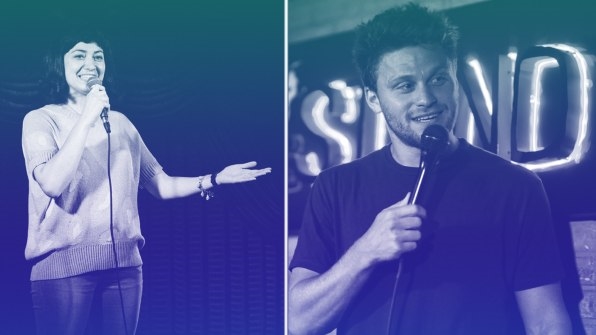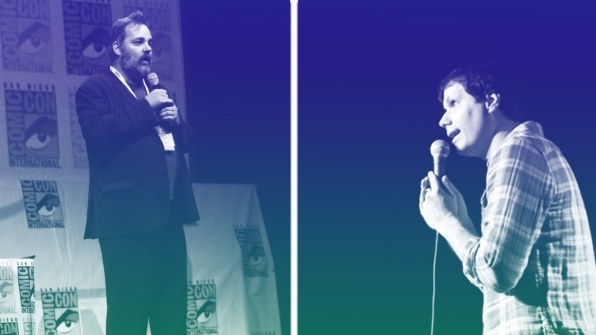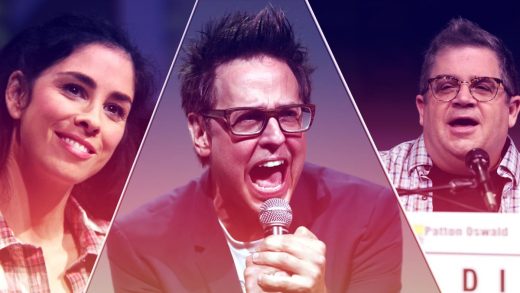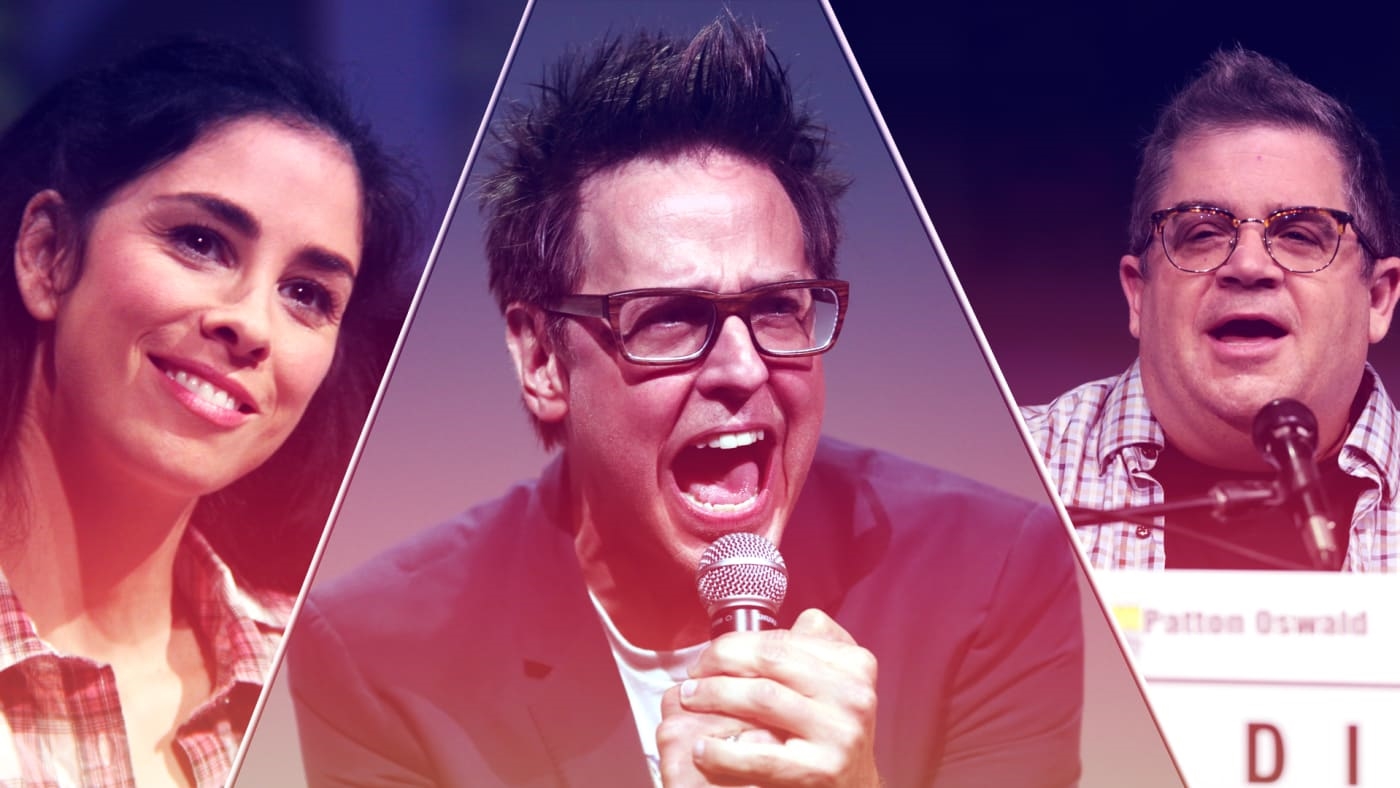Mike Cernovich’s campaign against comedians is bound to fail
Pedophilia is no laughing matter. This is beyond debate. However, some people have job descriptions that include panning for comedic gold in off-limits areas. James Gunn is unfortunately not one of them.
Gunn’s job description includes making movies that are partly aimed at children. At least it did until last Friday. That’s when Disney fired the Guardians of the Galaxy director from the next installment of the franchise he built when it emerged that Gunn had made a series of terrible tweets between 2008 and 2011, touching on rape and pedophilia.
Well, “emerged” is inaccurate; the tweets didn’t surface themselves. Rather, alt-right culture warrior Mike Cernovich dug them up in a coordinated effort to claim an outspoken liberal scalp. The ploy worked.
Buoyed by quick success, Cernovich and his alt-right troll mob are now going after similarly outspoken comedians, like Patton Oswalt and Sarah Silverman. Even if they surface tweets as indefensible as Gunn’s, though–and they almost certainly will–their mission is doomed to fail. Comedians cannot be held to the same standards as other creative professionals, and for good reason.
Comedians often become comedians because their brains work in different ways than other people’s. When their synapses are firing, they tend to make connections that other people might not. Since one of the keys to comedy is “unexpected conclusions,” being able to generate such thoughts automatically is a genetic advantage. Successful comedians invest creative energy into channeling their oddest thoughts into structured forms. It’s how they develop their own distinct voice. Along the way to getting there, however, comedians will misfire spectacularly at least 1 million or so times.
It used to be that comedians did their misfiring exclusively at open mics in comedy clubs. These dank venues served as safe spaces, where audience feedback (or lack thereof) gently nudged fledgling comics away from racist, sexist, or otherwise disgusting material that missed the mark by a wide margin.
The advent of Twitter, however, changed the game. Suddenly, there was an open mic available on your phone or desktop, and instead of five minutes, you had all the time in the world. Rookie comedians used the site to find their voices, while successful ones used it to test out material or find a home for joke-shaped thoughts that didn’t quite work. Despite the ubiquity of the mantra, “the internet is forever,” though, it was only recently that comedians began to realize their old tweets could be used against them.

In 2015 and 2016, a pair of Saturday Night Live hires, Jon Rudnitsky and Melissa Villaseñor, faced intense scrutiny of their Twitter histories once they were tapped to join the show. Internet sleuths waded through their feeds looking for objectionable material, as though they had the panopticon capabilities of reviewing someone like Dave Chappelle’s open-mic material from the early 1990s. They found jokes that could be considered racist and sexist, but the SNL brass took time to make a decision and ultimately ruled that they would stand behind their hires. In each case, the controversy died down almost immediately.
A more jarring case of a comedian’s tweets coming back to haunt them, and one more relevant to this discussion, took place last fall. Sam Seder had moved beyond the sphere of two-drink minimums to become a credible figure of news punditry, as host of the radio show, Majority Report, and as a regular contributor to MSNBC. Once Cernovich found a sarcastic, nine-year-old joke Seder had made about Roman Polanski and child rape that out of context appeared to endorse a despicable act, he used it to pressure MSNBC into firing Seder. After Seder fought back, the network elected to reverse course and rehire him, but the message was still clear: You are not safe from your old, bad tweets.
Comedians should not get a pass on every single joke they’ve made. However, before anyone who employs a comedian decides to sever ties over old tweets, they should consider certain criteria. It all comes down to intent, timing, how the person who made the bad tweets reacts once exposed, and who is doing the exposing. Was the tweet clumsily flippant, despite its heady subject matter? Or was it an expression of hate or malicious intent? Was it written 10 years ago, or last Tuesday? Has the comedian apologized and attempted to make amends to anyone offended? Or do they rail against the easily triggered masses and shirk responsibility? And finally, why are we even seeing this tweet at all?
In the case of James Gunn and the even more recent wave of comedians whose tweets are being held against them, the reason is that Mike Cernovich wants to smear liberals. Cernovich is a bad-faith actor with an army of nihilistic trolls at his command, whom he can swiftly rally to pretend at being mortally offended.
It’s a paradoxical offensive, on many different levels. For one thing, part of the supposed justification for these smears is Cernovich’s suggestion that these people could conceivably act on the pedophilia or rape depicted in their jokes. Beyond the incredible gulf between jokes and actions, though, this idea is ludicrous, because Mike Cernovich clearly doesn’t care about actual, non-politically advantageous sex crimes perpetrated in the world. (August 02, 2018), alleged sex cult recruiter R. Kelly released a new song, and Cernovich had nothing to say. He supported Roy Moore last fall. He also remains not even remotely disturbed by the fact the President once bragged to Howard Stern about purposefully barging into the dressing rooms of Miss Teen USA contestants while they were changing. Not to mention that Cernovich has tweeted not-at-all-joking statements about date rape being a false construct, and he himself was accused of rape in 2003. Does this sound like a person whose pearl-clutching should inspire action inside Corporate America?
In the case of Disney caving in to Cernovich, it’s a thorny issue. Disney is a family-friendly company, James Gunn is not a comedian, and the sheer volume of the director’s tweets on the topic of pedophilia is discomfiting, to put it mildly. However, the speed with which the company kowtowed to an alt-right army, rather than conducting an internal review, sets a dangerous precedent. Did the company even consider whom they were capitulating to? Or what signal it’d send by doing so?
So far, that signal hasn’t extended to any of Cernovich’s newfound targets: actual comedians.

None of Michael Ian Black’s various employers have moved to distance themselves from him, after a trove of his tweets came to light over the weekend. When a pedophilia joke of Dan Harmon’s from 2009 surfaced on Monday, the Rick and Morty co-creator promptly apologized and deleted his Twitter account, and he has not yet incurred any further fallout. One imagines the executives at Adult Swim, which distributes Rick and Morty, approaching the matter differently than Disney. Comedian Kyle Kinane either preemptively tried to get ahead of any possible backlash from a 10-year-old racist visual joke of his, or he invented it as a comment on what’s happening now.
One of the most frustrating aspects of this whole attempted purge is that a core tenet of alt-right philosophy holds that political correctness is the scourge of modern America. But what could be more PC than trying to get comedians fired for offensive jokes? Perhaps the irony is intentional, an attempt to establish a false equivalence between these comedians and the famously fired Roseanne Barr. (Another core tenet of alt-right philosophy is “making false equivalences.”)
Going through the criteria I established earlier, the tweet that got Barr fired was: a) intended to mock the physical appearance of a woman, with classically racist imagery, b) she tweeted it not while finding her voice as a young comic long ago but in the present tense, c) she still has never owned up to the implication of her tweet, and d) many of the people calling for her ouster seemed legitimately offended. Barr’s was not a case of political correctness run amok but rather of a corporation (also Disney) establishing that it would not tolerate demonstrable racism.
The alt-right, fellow travelers of Roseanne Barr, are apparently trying to co-opt political correctness in order to destroy it.
Dredging up liberal comedians’ old tweets, though, only underscores the inherent value of political correctness. The reason these old tweets are so galling now is that broad shifts in cultural sensibilities happen rapidly. These old bad jokes stand out because it’s hard to imagine these comedians making them in 2018. And that’s a positive thing. Political correctness has made it so that comedians have to up their game. The best comics see it as a challenge; they ask themselves, “How can I respectfully approach the topic of trans people, if I must, rather than just make the easy Caitlin Jenner joke?” The not-so-best ones simply lament what they’re no longer “allowed” to say, or say it anyway for a naughty transgressive thrill that exists purely in their imaginations.
By showing who these comedians used to be, Cernovich is only revealing who they’ve become. His plan is bound to backfire.
(7)



